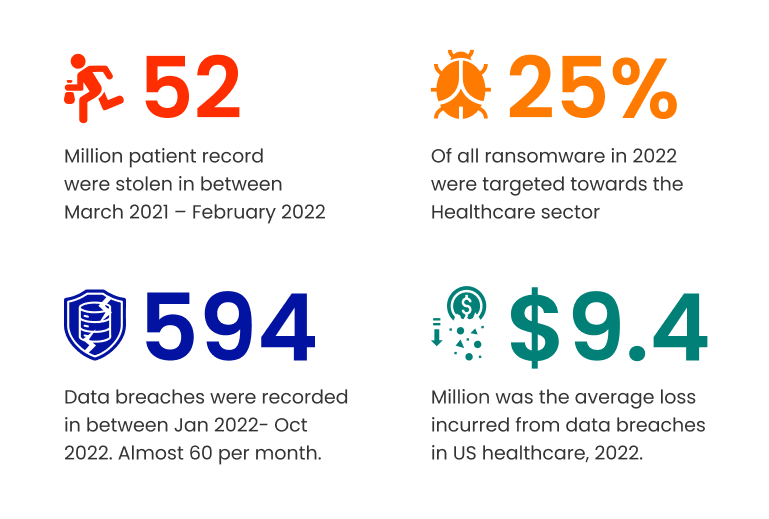In today’s interconnected world, cyberattacks have become a looming threat for various industries. However, one sector that has been particularly vulnerable is the US healthcare industry. Recent incidents, such as the cyberattack on Norton Health, have shed light on the immediate need for robust cybersecurity measures within this critical sector. This attack on the healthcare giant Norton has left patients with canceled surgeries, delayed appointments, and days of waiting just to get prescriptions refilled. And this is nothing new, in the past 3 months, this is the third time we experienced another cyber-attack. One of the most significant attacks was on NextGen Healthcare (a major EHR provider), a cyber attack that impacted over a million patients.
This attack on Norton has led to the cancelation of various surgery appointments, leaving people at the mercy of nature. 74-year-old Tony Young said in an interview that his appointment for heart valve replacement surgery was canceled and removed from the hospital’s records after the attack on 9th May. Patients are obviously worried about their appointments, with a lot of them blaming the hospital for their negligence. In the case of NextGen, the damage was more severe. NextGen said that hackers stole/accessed patients’ names, dates of birth, addresses, and social security numbers of 1.05 million patients. The hackers had infiltrated NextGen office system, a cloud-based EHR and practice management solution. According to the report, a client credential that was stolen from other sources was used by the hackers.
The stats from the previous years are frightening and have shown no signs of decay this year.

This blog explores the reasons behind these attacks and emphasizes the importance of investing in custom cybersecurity solutions from trusted partners to safeguard sensitive healthcare data.
Understanding the Reasons Why Cyberattacks on Healthcare loom large?
There are mainly 4 main reasons.
Value of Healthcare Data: Personal health information is highly valuable on the black market, making it an attractive target for hackers. Medical records, insurance details, and other healthcare data can be sold for significant sums, leading to financial gains for cybercriminals.
Inadequate Cybersecurity Measures: The healthcare industry has traditionally lagged behind other sectors in terms of cybersecurity preparedness. Legacy systems, outdated software, and insufficient training contribute to the vulnerabilities within healthcare networks, making them prime targets for exploitation.
Incompetent staff: Staff members often pose vulnerabilities in the cybersecurity landscape, making it crucial to prioritize ongoing training. Regular cybersecurity education should cover vital areas such as recognizing and thwarting phishing attempts, practicing strong password management, and emphasizing the significance of timely software updates. Just as clinicians understand the importance of frequent hand washing, an unwavering commitment to security education empowers employees to become the first line of defense against evolving cyber threats.
Lousy partner systems: Within the complex ecosystem of healthcare organizations, where countless software applications are utilized and multiple vendors are engaged, it becomes imperative to closely scrutinize these partnerships. While healthcare organizations may not bear direct responsibility for breaches caused by their business associates, they are still accountable for the protection of patient data. Consequently, establishing a robust framework for evaluating and monitoring these partnerships becomes a critical risk management factor.
The Importance of Custom Solutions from Trusted Partners
Custom solutions from trusted partners are essential in mitigating the risk of cyber-attacks in healthcare.
- These solutions provide tailored protection by addressing the sector’s unique vulnerabilities with multi-layered defenses, including robust network monitoring and strict access controls.
- They ensure compliance with stringent regulations like HIPAA, protecting patient data and preventing regulatory violations.
- Proactive threat detection and response capabilities through advanced threat intelligence and machine learning algorithms, enable organizations to stay ahead of cybercriminals and minimize the impact on patient care and data security.
- Partnering with a trusted healthcare IT solution provider can bolster cybersecurity and safeguard sensitive healthcare information.
Conclusion
The recent cyberattack on giants like Norton Health and NextGen should serve as a wake-up call for the US healthcare sector. It underscores the urgent need for robust cybersecurity measures to protect sensitive patient data and ensure uninterrupted access to critical medical services. Healthcare organizations must recognize the motivations behind these attacks and invest in custom solutions only from partners who are trusted and experienced. By doing so, they can fortify their defenses and help build a more secure healthcare ecosystem that prioritizes patient well-being and data privacy. In an increasingly interconnected world, cybersecurity in the healthcare sector is no longer an option—it is an absolute necessity. Connect with us for custom solutions which will enhance your process while guaranteeing better security. Email us at info@nalashaa.com
Mitrajit Das
Latest posts by Mitrajit Das (see all)
- Telehealth Future Trends 2024 – All you need to Know - July 6, 2024